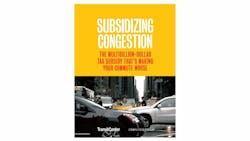Subsidizing Congestion: The Multibillion-Dollar Tax Subsidy That’s Making Your Commute Worse
The federal government provides subsidies through the tax code for employer-provided and employer-paid automobile parking, transit passes, and some other commuter expenses, but it does so in ways that run counter to the nation’s overall transportation goals.
Ultimately, the effect of the tax benefit for commuter parking is to subsidize traffic congestion by putting roughly 820,000 more cars on America’s most congested roads in its most congested cities at the most congested times of day. It delivers the greatest benefits to those who need them least, typically upper-income Americans, and costs $7.3 billion in reduced tax revenue that must be made up through cuts in government programs, a higher deficit, or increases in taxes on other Americans.
